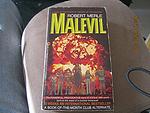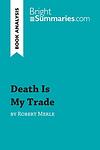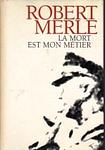Robert Merle
Robert Merle (1908–2004) was a French novelist known for his works that span various genres, including historical fiction, science fiction, and adventure. He is perhaps best known for his series 'Fortunes of France,' which follows a Protestant family through several centuries of French history. Merle received the Prix Goncourt, one of France's most prestigious literary awards, for his novel 'Weekend at Zuydcoote,' which depicts the evacuation of Dunkirk during World War II.
Books
This list of books are ONLY the books that have been ranked on the lists that are aggregated on this site. This is not a comprehensive list of all books by this author.
-
1. Malevil
Set in the aftermath of a devastating nuclear war, the novel follows a group of survivors who find refuge in a medieval castle named Malevil. The survivors, led by the protagonist, must navigate the challenges of rebuilding their lives in a drastically altered world. They grapple with issues of survival, community, morality, and leadership as they encounter other groups of survivors with different philosophies and intentions. The story is a gripping exploration of human resilience, the will to maintain civilization, and the complexities of interpersonal relationships in a post-apocalyptic setting.
-
2. The Day of the Dolphin
The book follows a brilliant and dedicated scientist who successfully trains dolphins to communicate in English. His ultimate goal is for them to become the world's first underwater spies, capable of infiltrating enemy territories undetected. However, his plans are derailed when the dolphins are kidnapped for a sinister plot to assassinate the President. The scientist must race against time to save both his dolphins and the President.
-
3. Death Is My Trade
The book is a fictionalized account of the life of Rudolf Höss, the commandant of Auschwitz concentration camp during World War II. It delves into the protagonist's personal history, tracing his journey from a troubled childhood through his rise in the ranks of the SS. The narrative provides a chilling insight into the bureaucratic and ideological mechanisms that led to the Holocaust, exploring the protagonist's role in the administration of mass murder and the psychological detachment that enabled him to view the extermination of millions as a job. The story is a harrowing examination of the banality of evil and the moral complexities of obedience to authority.
-
4. La Mort Est Mon Métier
The book is a fictionalized account of the life of Rudolf Höss, the commandant of Auschwitz concentration camp during World War II. It delves into the psychological and moral journey of the protagonist, who is portrayed as a man deeply committed to duty and efficiency, as he rises through the ranks of the SS. The narrative provides a chilling insight into the banality of evil, exploring how an ordinary man can become a willing participant in one of history's most horrific genocides. Through the protagonist's perspective, the novel examines the mechanisms of Nazi ideology and the bureaucratic machinery of the Holocaust, ultimately questioning the nature of obedience and the moral responsibility of individuals within a totalitarian regime.
-
5. The Island
The novel is a historical fiction set in the 18th century, following a group of mutineers who, after seizing a ship, find themselves on a deserted island. Striving to create a utopian society free from the constraints of their previous lives, the castaways establish a community with egalitarian principles. However, their attempts at an idealistic life are challenged by the complexities of human nature, power struggles, and the difficulties of survival in an isolated environment. As the narrative unfolds, the island becomes a microcosm for the broader human experience, exploring themes of freedom, governance, and morality.




